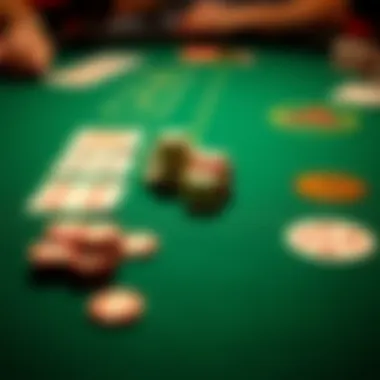Mastering 5 Card Poker: Strategies and Gameplay Insights


Intro
5 card poker, a stalwart in the grand casino game selection, has captivated both novice and seasoned players over the years. It's not just a game of luck; it's intricately tied to strategy, wit, and psychological prowess. Whether you're peeking at your hand in a bustling casino or sitting at home, the challenges and excitement of 5 card poker create an engaging experience every time.
This guide breaks down everything you need to know about 5 card poker, steering through the nuanced rules, time-tested strategies, and effective gameplay techniques. The landscape of 5 card poker can be as broad as the ocean and as deep as a well, so let’s dive into its core elements to sharpen your skills and fine-tune your decision-making ability at the table.
Expect to learn the essential mechanics of the game, discover expert tips that can pave your path to victory, and explore the distinctive strategies that separate novices from masters. With this comprehensive guide, your journey into the world of 5 card poker begins, transforming you into the player you aspire to be.
Understanding Card Poker
Understanding the intricacies of 5 card poker forms the foundation of becoming a skilled player. It’s not just about knowing the rules; it involves delving into the strategic elements that can set one apart at the table. A deep comprehension of game dynamics, player psychology, and betting strategies enhances decision-making, preventing rash choices that can lead to costly mistakes.
To truly master the game, players must grasp various factors, such as hand rankings and the flow of play. In a game that seems straightforward, complexities abound. Selecting when to play a hand, when to fold, and how to read opponents are crucial in building superiority over others. With these thoughts in mind, let’s explore the definition and roots of this captivating game.
Definition and Origins
5 card poker, at its core, is a simple yet engaging card game enjoyed in homes, casinos, and online settings. The game revolves around players forming the best five-card hand from a standard 52-card deck. Knowledge of standard poker hand rankings is pivotal for success. The origins of poker trace back to various card games played in different cultures. The genesis likely lies in a mix of forms like the French game Poque and its derivatives, which morphed over centuries into the poker variants we know today.
Additionally, the game made its way to America during the 19th century. The mining boom and riverboats contributed to its spread, and it morphed into various versions, with 5 card poker becoming especially popular thanks to its straightforward rules and fast pace. It’s fascinating to see how these early influences still shape how we approach the game today.
Popularity in Modern Gaming
In today’s digital age, 5 card poker retains its popularity amidst a myriad of gaming options. The game’s simplicity makes it accessible, inviting players of all skill levels to join in. Whether in a cozy living room setting or at fast-paced online tables, there’s a familiarity that draws individuals in. It's not uncommon for a casual game night to feature a fun round of 5 card poker, because it requires little setup and is fun for both novices and seasoned players.
The rise of online platforms has further fueled its popularity, making it easier for players to compete against others worldwide. With live-streamed poker tournaments and interactive features, the thrill is more palpable than ever. Moreover, poker communities thrive on platforms like Reddit, where players share tips and strategies, further enhancing learning opportunities for those venturing into the game.
"5 card poker captures the essence of strategy and chance, making it a timeless classic enjoyed by many."
As player numbers grow, so does the challenge of competition, often pushing individuals to enhance their understanding and approach to the game. In a nutshell, grasping the essence of 5 card poker is invaluable, as it not only enriches the gaming experience but also sharpens one’s overall strategic thinking.
Basic Rules of Card Poker
Understanding the basic rules of 5 Card Poker is crucial for anyone looking to elevate their game. These foundational elements not only help players grasp the mechanics of the game but also set the stage for more advanced strategies. Whether it's your first time playing or you've been at it for a while, knowing the rules can drastically impact your gaming experience and outcomes.
Objective of the Game
The primary aim of 5 Card Poker is straightforward: players compete to create the highest-ranking hand possible using five cards. The better your hand, the more likely you are to win against your opponents. Each player is dealt five cards, and the game progresses through rounds of betting. In essence, mastering the basics of hand rankings and betting is the key to not only enjoying the game but also increasing your chances of success. If you do not know what you’re aiming for, how can you even hope to hit the target?
Card Rankings Explained
In poker, the ranking of cards plays a pivotal role in determining the winner of each hand. Understanding these rankings is fundamental. Here’s a quick rundown of hands, from strongest to weakest:
- Royal Flush: This is the creme de la creme, consisting of A, K, Q, J, and 10, all of the same suit.
- Straight Flush: Five cards of sequential rank and the same suit. An example would be 7, 8, 9, 10, and J of diamonds.
- Four of a Kind: Four cards of the same rank, such as four kings.
- Full House: A combination of three of a kind and a pair.
- Flush: Any five cards of the same suit, not in sequence.
- Straight: Five cards in sequence, regardless of suit.
- Three of a Kind: Three cards of the same rank.
- Two Pair: Two separate sets of pairs.
- One Pair: Two cards of the same rank.
- High Card: When no other hand is made, the highest card plays a crucial role in determining the winner.
It’s essential to not just memorize these rankings but to understand situational contexts in which they can be applied effectively during gameplay. This understanding helps in deciding whether to call, raise, or fold.
Dealing and Betting Structure
The flow of a 5 Card Poker game typically follows a structured format, which can vary slightly depending on the specific variant being played. Generally, players start by placing an initial bet before being dealt their cards. After everyone has their five cards, a round of betting takes place. This round is where players decide whether to fold, call, or raise based on their hand strength.


After the betting round concludes, players may have the opportunity to exchange a certain number of their cards, adding an element of strategy to the mix. Once this exchange is complete, a final round of betting occurs, leading to a showdown where players reveal their hands. The player with the highest-ranking hand wins the pot.
The order of play can depend on seating arrangements, often based on the position of the dealer. Players need to be conscious of their position at the table as it provides them with strategic advantages or disadvantages during betting rounds. Understanding how the dealing and betting structures work is vital for making informed decisions at the table.
"Poker is a game of skill and strategy, but remember, luck often plays its part too."
Familiarizing yourself with these basic rules will not only make the gaming experience smoother but also sharpen your strategic thinking as you navigate the complexities of 5 Card Poker.
Strategies for Success
Success in 5 Card Poker doesn't come with just a good hand; it takes a strategic mindset and a grasp of the subtleties of the game. Understanding various strategies is essential for elevating one’s gameplay. These strategies aren’t merely tricks but rather a foundational approach to reading the game, predicting opponents’ moves, and minimizing the odds of loss. Within this section, we will explore the critical areas you must master to gain an edge at the poker table.
Understanding Your Hand Strength
Your hand strength dictates your position in the game. In poker, a strong hand means a higher chance of winning, but many players significantly overestimate their hands. Knowing when to stand firm or fold based on the strength of your hand is crucial.
For instance, consider the difference between a pair of aces and a flush. While the pair is strong, it’s often not enough against a flush or straight.
- Key tips:
- Always assess your hand in relation to potential community cards.*
- Be aware of the betting patterns, which can signify the strength of opponents’ hands.*
- Do not hesitate to fold if the odds are against you; sometimes, less is more.
Positioning at the Table
Positioning in 5 Card Poker can mean the difference between winning big and walking away empty-handed. Being aware of your spot at the table—a later position often allows for more insight into others’ decisions, while an earlier position might require more cautious play.
- Strategic Approach:
- In late positions, you have the advantage of seeing how others play before deciding your next move.*
- Use early positions for strong hands only, preserving fewer risky confrontations.*
- In the middle, weigh your options carefully; it’s often a balancing act.
Calculating Odds and Outs
An analytical approach to poker can set skilled players apart. Odds reflect the potential probabilities of success, while Outs refer to the cards left in the deck that could improve your hand.
Understanding these concepts allows you to make informed decisions, striking a balance between aggression and caution.
For example, if you know around 40% of the remaining cards could improve your hand, you can weigh that against the pot odds, determining whether to call, bet, or fold.
- Quick Formula:
- To estimate your odds, simply divide the number of outs by the total unseen cards and multiply by 100.*
- The closer you can get to accurate percentages, the better your decision-making will become.*
Bluffing Techniques
Bluffing is an art. A well-timed bluff can lead to a hefty pot without needing the strongest hand. However, overdoing it can backfire, leading to losses. The key is to discern when your bluff could actually convince others that you possess a superb hand.
- Consider the following:
- Your table image affects how effective your bluff will be. If you’re perceived as a robust player, opponents are more likely to fall for it.*
- Pay attention to the betting patterns to gauge whether it's viable to bluff or not.*
- Bluffs are often more effective in late positions, where players may be more hesitant.
Reading Opponents
Reading your opponents is like learning a complex language. It requires practice and acute observation. Look for patterns in betting behavior, note their reactions when facing pressure, and study their tendencies overall.


- Tips to Improve:
- Keep a poker face; don’t give away your own hand through body language.*
- Notice how your opponents behave when they have strong vs. weak hands; often, this can provide invaluable insight.*
- Take mental notes of players’ styles and adjust your strategy accordingly.
"Poker is a game of skill where observation can turn the tide in your favor."
Advanced Gameplay Concepts
Mastering the nuances of 5 Card Poker doesn't stop at the basic rules and strategies. Delving into advanced gameplay concepts can significantly enhance a player's understanding and approach to the game. It’s akin to having a well-stocked toolbox when you embark on a home project; you may already have the essentials, but the specialty tools will enable you to tackle more complex tasks with finesse. By concentrating on these advanced strategies, players can not only elevate their gameplay but also increase their chances of success in various scenarios.
Game Variants to Consider
5 Card Poker has its roots in various game variants, each providing a unique twist to the core mechanics while keeping the essence intact. Exploring these variants can be beneficial.
- Texas Hold'em: Although it’s a bit of a misnomer in relation to traditional 5 Card Poker, Hold'em still allows you to appreciate playing styles and strategies.
- Five Card Draw: This classic variant is where poker meets imagination; players draw new cards to improve their hands, demanding an understanding of probability and psychology.
- Stud Poker: Unlike the common draw formats, Stud Poker requires players to engage with visible and hidden cards, making position and timing crucial.
These variants don’t just offer a different gaming experience, they also foster adaptability. Learning them sharpens your instincts, allowing you to adjust your strategy based on the game you’re engaged in.
Adjusting Strategy Against Different Opponents
In poker, as in life, you can't dance to the same tune every time. Adjusting your strategy based on the opponents you face on the table is crucial. This is where keen observation is your ally. Here's how to go about it:
- Aggressive vs. Passive Players: If you find yourself hashing it out with aggressive players, tighten your range and trap them. On the other hand, if your rivals are more passive, take advantage by playing a more assertive style.
- Experienced vs. Novice Players: Experienced opponents often display nuanced strategies, likely using bluffs and calculated bets. In such cases, look for patterns and play tighter. For novices, don’t be afraid to exploit their lack of knowledge—get aggressive!
- Emotional Players: These individuals are often unpredictable. Keep a close watch; if they're emotional, they might go all in on a weak hand. Make your move based on their emotional state.
Changing your approach according to the dynamics at the table is not just an art; it’s an advanced skill that can lead to significant benefits.
Psychology of Poker
The mind game behind poker is as riveting as the hand you're dealt. Understanding the psychology of not only your opponents but also yourself can impact your overall performance tremendously. Consider these points:
“Poker is not just about the cards in your hand but the cards in everyone else's hands as well.”
- Reading Opponents: Memorizing common tells can provide insight into your opponents’ hands and betting patterns. Look for physical cues, such as fidgeting or changes in their tone when they bet.
- Betting Patterns: Pay attention to how others bet based on the cards showing. For instance, an opponent who consistently raises may indicate confidence in their hand.
- Mental Fortitude: Emotions can wreak havoc in decision-making. Cultivating a disciplined mindset helps mitigate the effects of bad beats or unexpected losses, ensuring you make optimal, rather than impulsive, choices.
Incorporating psychological tactics into your strategy not only sharpens your edges in gameplay but also allows you to analyze the game in a fundamentally richer aspect. By merging strategic thinking with mental acuity, you can take your 5 Card Poker game to staggering heights.
Common Mistakes to Avoid
In the world of 5 card poker, the line between winning and losing often rests on the decisions players make. Understanding common mistakes is paramount for both fresh faces and seasoned pros. The game is laden with traps, and recognizing them can make a significant difference in your performance and enjoyment of the game. Avoiding these blunders not only helps in minimizing losses but also rectifies your approach to strategy and game dynamics.
Playing Too Many Hands
One of the biggest pitfalls players encounter is the tendency to play too many hands. It's easy, especially for new players, to get excited and want to be involved in every hand dealt. However, this can lead to poor decision-making and quick losses. Playing too many hands typically means you're entering pots with weaker cards, thus lowering your chances of winning.
To counter this, adopt a more selective strategy while evaluating starting hands. Consider the strength of your hand in relation to the cards on the table and your opponents' actions. For example, if you’re dealt a high pair, that's one thing, but if you’re holding unsuited connectors that are low, it might be better to fold. A good rule of thumb is to stick to playing premium hands and gradually expand your range as you gain more confidence and experience.
“Quality over quantity. This is essential. Selectivity can keep you in the game longer.”
Ignoring Position


Another frequent error is ignoring table position. In poker, your position at the table plays a crucial role in shaping your strategy. Players who act earlier in the betting round have less information about their opponents’ actions, while those acting later can base their decisions on the actions taken by others.
If you're sitting in an early position, it’s wise to play conservatively, as you'll be acting before most players. Conversely, if you find yourself in a late position, you can afford to play more aggressively, since you have a clearer view of how other players are betting. This situational awareness can set you apart from your competitors and can vouch for a more informed decision-making process.
Mismanagement of Bankroll
Lastly, mismanagement of bankroll is a common mistake that can lead to severe consequences for players. Knowing how much you're willing to lose and what constitutes your limits is vital in poker. Many players fall into the trap of chasing losses or betting more than they should based on emotions rather than strategies.
To mitigate this risk, set aside a fixed amount of money for poker, separate from your everyday finances. Stick to this bankroll, and don’t dip into other funds when things go south. Avoid playing at stakes where your comfort is compromised; instead, opt for buy-ins that fit your budget, allowing for more strategic gameplay rather than desperation.
By steering clear of these common mistakes, you're not just safeguarding your funds but also honing your overall poker strategy. Ultimately, embracing a disciplined approach to your play can lead to a more rewarding poker experience.
Resources for Further Learning
Learning about 5 card poker doesn’t stop at just reading this guide; it’s a continuous journey. Having access to various resources can enhance your understanding and sharpen your skills. The world of poker is vast, with many layers to explore. From analyzing different strategies to discussing hands with peers, diving into additional material can expose you to perspectives you may not have encountered. This section discusses valuable resources that can serve as building blocks in your poker education.
Books and Literature
Books can be a poker player’s best friend. Unlike fleeting tutorials or short videos, a well-written book can provide depth and context that other mediums often lack. Some profound books about poker cover a variety of topics, from theory and strategy to psychology and game play. For instance, The Theory of Poker by David Sklansky offers insightful strategies that apply to many forms of poker, including 5 card variations. Additionally, Harrington on Hold ’em by Dan Harrington delves into strategic tournament play that can also lend insight into various aspects of 5 card poker.
Consider creating a small reading list of essential poker literature to guide your study. There are even comprehensive resources available online, like the poker section on Wikipedia, where you can browse foundational texts and articles. The advantages of turning pages can’t be overlooked; they often keep you focused and better your long-term retention of the material.
Online Courses and Tutorials
In this digital age, online courses and tutorials can be a game changer for learning 5 card poker. Websites like Udemy or Coursera offer structured courses taught by experienced professionals. These courses often break down complex concepts into digestible parts, allowing you to progress at your own pace. For example, a course covering foundational poker concepts can give you a solid start before diving deeper into advanced tactics.
Furthermore, platforms such as YouTube host a treasure trove of video content where players share their insights, strategies, and live gameplay analysis. Finding a poker tutor who can provide tailored advice and feedback can also be incredibly beneficial. This personalized touch can help you refine your strategies in real-time, setting you on the right path.
Join Local Poker Communities
The best way to grow as a poker player is often through community engagement. Join your local poker clubs or online forums, like those found on Reddit. Here, you can interact with other players, share experiences, and participate in discussions that bring new ideas to light. Getting involved in local games not only hones your skills but helps you understand the social and psychological aspects of the game as well.
Additionally, local poker meetups or tournaments typically provide an excellent avenue for networking with other players. Engaging with a variety of players expands your perspectives and can lead to fruitful discussions about strategies and experiences. You might learn a lot by simply listening to others’ stories about their wins, losses, and the lessons they've gathered along the way.
Remember that every interaction can be a learning moment, whether it's a high-stakes game or a casual home game with friends. The insights you gain from these interactions can be invaluable and often lead to unexpected improvement in your gameplay.
Finale and Final Thoughts
As we wrap up our comprehensive exploration of 5 Card Poker, it’s crucial to reflect on the intricate tapestry of knowledge we've woven together. Throughout this guide, we've tackled not just the basic rules, but we’ve also peeled back the layers that define successful gameplay strategies, common pitfalls to be avoided, and avenues for continual learning. Understanding these elements is not merely academic; rather, it cultivates a deeper appreciation for the game itself and enhances one’s decision-making capabilities at the table.
The biggest takeaway here is that mastery doesn’t come overnight. Engaging in this card game offers a blend of analytical skill and psychological strategy, which requires time and practice to fully develop. It’s about refining your instincts and learning to read the nuances of the game alongside your opponents’ behaviors.
Recap of Key Points
- Foundational Skills: Knowing the rules and card rankings is just the jump-off point in 5 Card Poker.
- Strategic Play: Successful strategies hinge on understanding hand strength, positioning, and the art of bluffing.
- Common Mistakes: Avoiding pitfalls, such as overextending your hand range and mismanaging your bankroll, can drastically change your outcomes for the better.
- Continuous Learning: Resources such as books, online courses, and local poker communities rank among the best ways to keep up to date and continuously enhance your gameplay.
"Poker is a skill game disguised as a gambling game. A seasoned player doesn't focus solely on luck but rather on keen judgment and calculated risk."
Encouragement to Practice
Practice is the lifeblood of improvement in any endeavor, and 5 Card Poker is no exception. Just as a musician hones their craft through repetition and creativity, a poker player must find time at the tables—whether online or in person—to experiment and develop their style.
Set aside designated practice sessions where you can implement what you’ve learned and test new strategies. Consider joining local poker nights or online platforms like pokerstars.com or 888poker.com, where you can play with diverse opponents.
Furthermore, frequent discussions within communities such as those found on reddit.com can offer valuable insights and perspectives that refine your approach. Don’t shy away from analyzing past games to identify what worked or what didn’t—this reflection can be incredibly informative.















